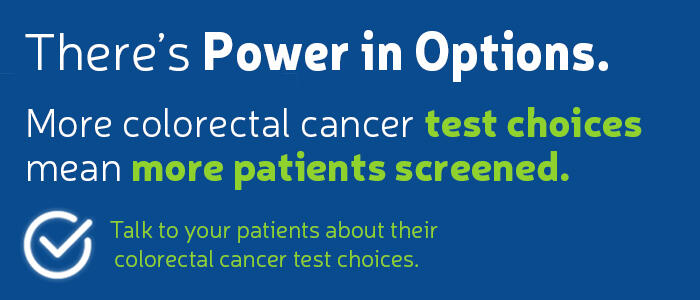Screening options
The U.S. Preventive Services Task Force (USPSTF) and the American Cancer Society recommend screening for average-risk adults, ages 45-75, using one of the following options:
- Annual, at-home stool tests: fecal immunochemical test (FIT), or high sensitivity guaiac-based fecal occult blood test (gFOBT)
- Flexible sigmoidoscopy every five years
- Colonoscopy every 10 years
The USPSTF states, “[N]o head-to-head studies demonstrated that any of the recommended screening strategies are more effective than others.” Research shows that patients have a significantly higher test completion rate when they are offered the option of a FOBT/FIT or colonoscopy. The National Colorectal Cancer Roundtable and the American Cancer Society have a call to action for recommending screenings to patients: The best test is the one that gets done.
Screening barriers
Colonoscopy has long been seen as the gold standard for colorectal cancer screening. But many patients face barriers to colonoscopies, including transportation, language, and lack of time. Any of these barriers can lead to inadequate prep, and ultimately, incomplete or missed exams. Discussing options for colorectal cancer screening can help match patients to the screening test they are most likely to complete, which leads to more patients getting screened.
Resources for providers
Colorectal Cancer Learning Collaborative
The Massachusetts Department of Public Health, in partnership with the Massachusetts League of Community Health Centers, has recruited and started their 5th Cohort of the Colorectal Cancer Learning Collaborative.
There are currently three federally qualified health centers participating in this two-year collaborative, which uses a quality improvement model to support health centers in increasing their colorectal cancer screening rates. Although the opportunity for formal participation in the learning collaborative is closed, all health centers in Massachusetts are welcome to join the Colorectal Cancer Learning Collaborative Online Community. There, members will have access to quarterly webinar opportunities, a library of resources including tools developed within the collaborative as well as a discussion board to post questions to other members.
To join the community and learn more, please email lskarnes@massleague.org.
The National Colorectal Cancer Roundtable and the CDC have a suite of resources for primary care practices to advance colorectal cancer screening:
- Colorectal Cancer Screening Clinician’s Guide: Cancer Screening Action Plan - an abridged version of the Toolbox and Guide
- Clinician’s Reference: Stool-Based Tests For Colorectal Cancer Screening
- Mailed Fecal Immunochemical Test (FIT) Online Courses | CDC
Free Continuing Medical Education Opportunity
The MA Department of Public Health and the Massachusetts Medical Society, with partnership from the American Cancer Society, offer a free CME course on the Efficacy of Stool Testing for Colorectal Cancer Screening. This course is intended for physicians, nurse practitioners, physician assistants, nurses, and leaders in public health.
